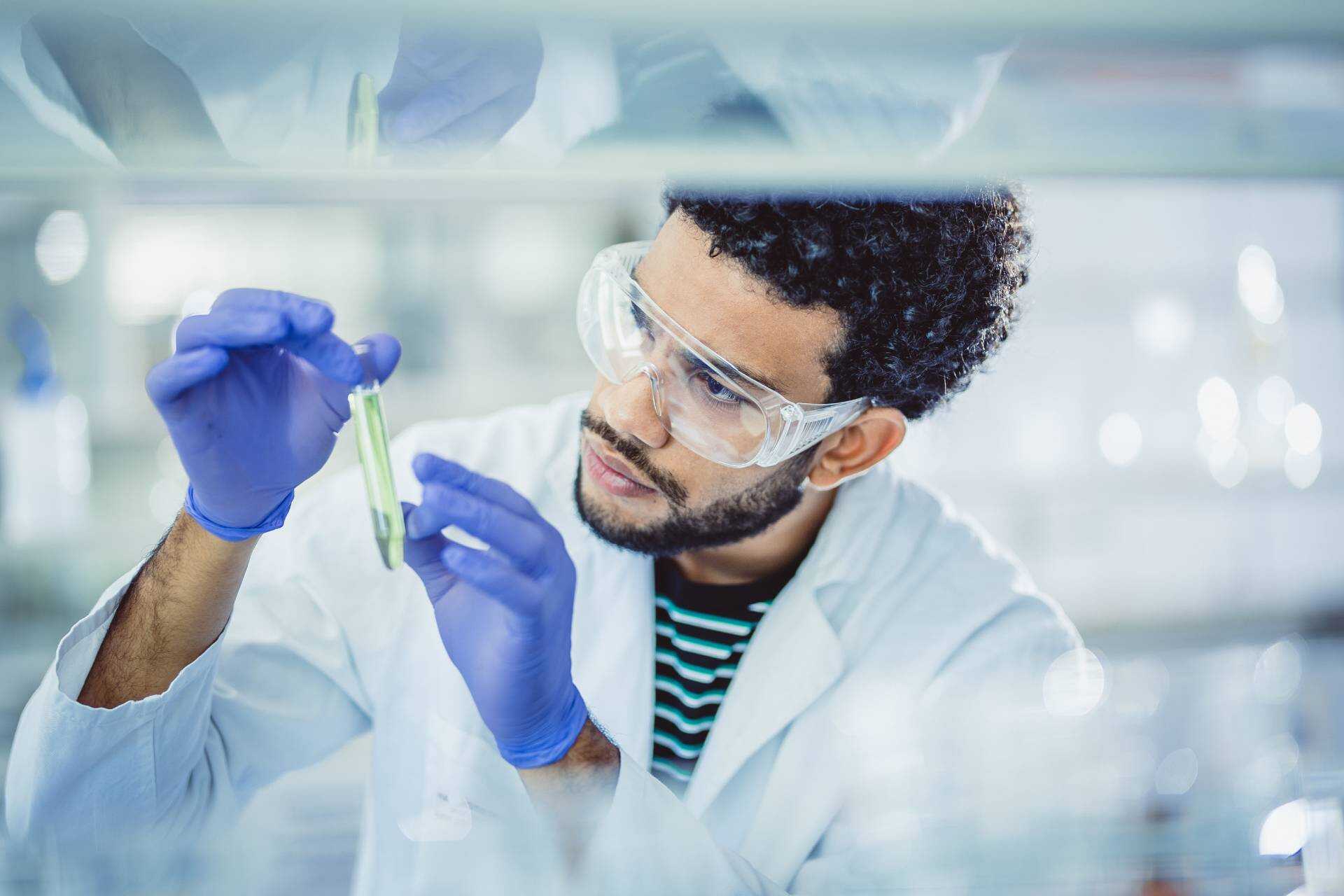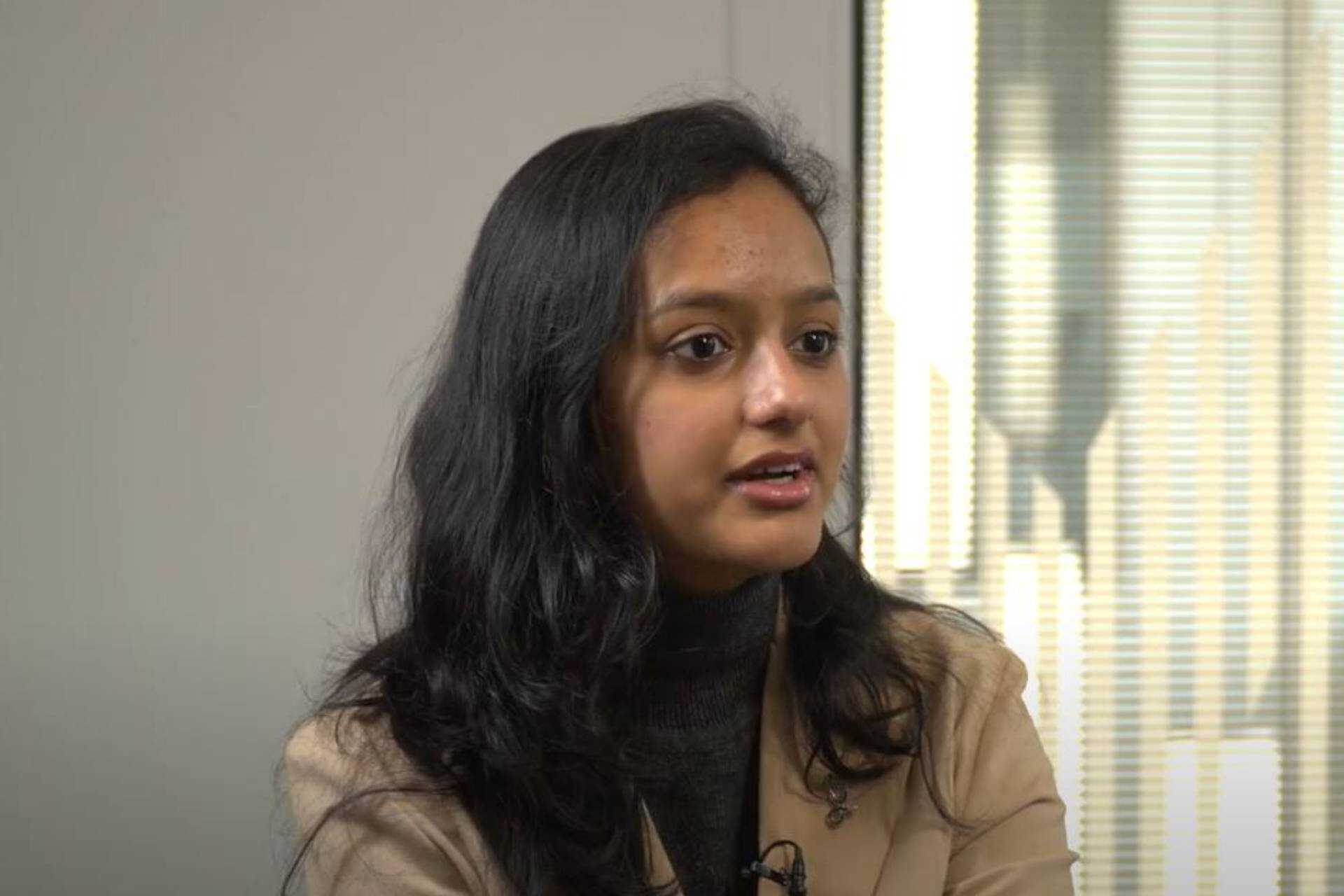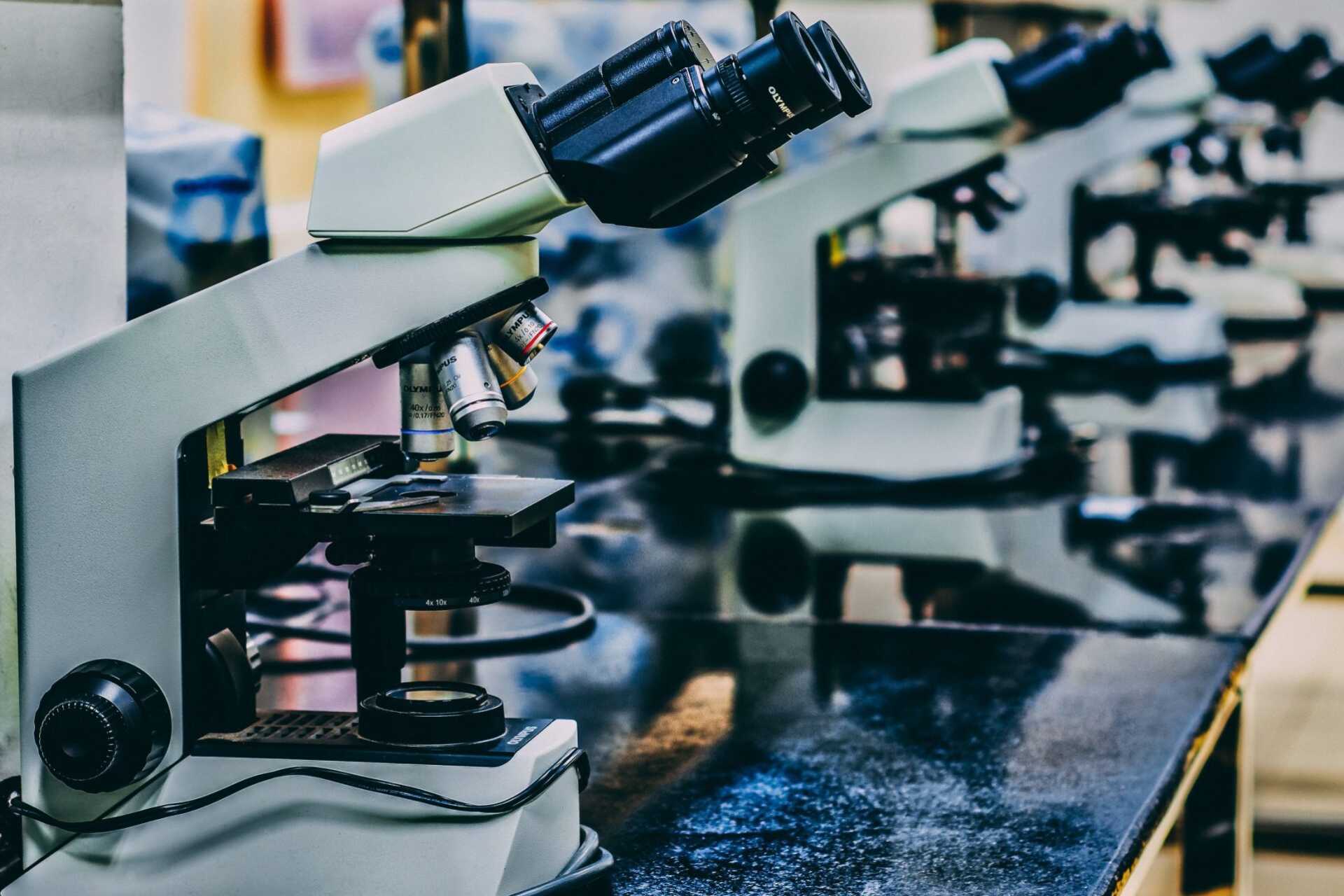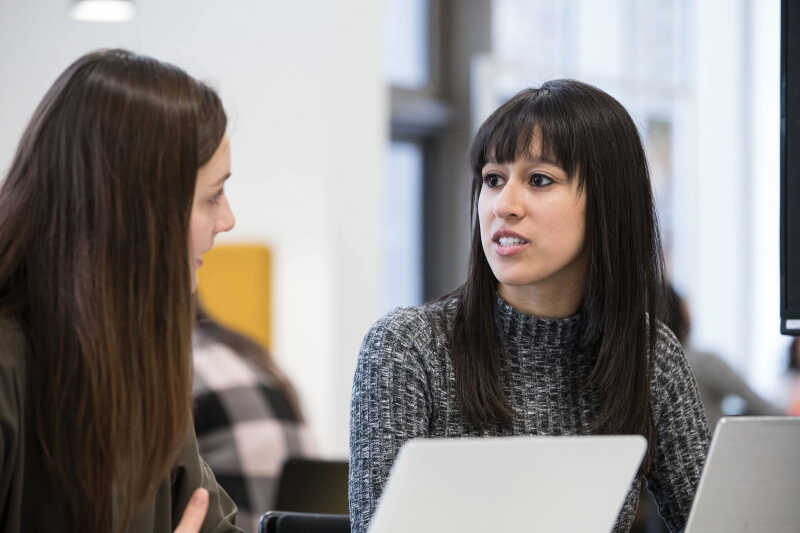Biomedical Science
with a Year in Professional Practice
Explore biochemical processes in the human body and help to identify and treat disease.

Explore biochemical processes in the human body and help to identify and treat disease.
Biomedical Science is the fundamental building block of medical practice. Without a deep understanding of the body, healthcare practitioners cannot truly understand, diagnose and treat illnesses and diseases, such as cancer. At Kent, we prepare you for successful careers within and beyond the world of biomedical science and equip you with the skill-set you need.
Tailor your degree to suit you with a sandwich year where you’ll work in industry for a year, giving you the chance to put into practice the skills you’ve learnt and build important connections. Taken between your second and final years, the Year in Professional Practice provides an excellent opportunity to gain relevant work experience in industry in the UK or abroad. During your placement you are paid by your employer and produce an independent research project.
Our BSc Biomedical Science courses are accredited by the Institute for Biomedical Science (IBMS), meaning our graduates are eligible for Trainee Biomedical Scientist roles directly following graduation. Our courses are also accredited by the Royal Society of Biology (RSB), while our four-year Biomedical Science with a Year in Professional Practice course has Advanced Accreditation. Students graduating from RSB recognised courses are eligible for associate membership and are entitled to two years’ membership at half price.

During Julia's paid placement at the NHS she gained real-world experience, made new connections and built a professional portfolio.
Go behind the scenes at hospital visits that highlight how you could use your skills.

Biomedical Science student Nivedita talks about her experience of the course.
You have the chance to take a paid Summer Studentship after your second year, giving you valuable hands-on experience in our research labs.

Regular investment in our laboratories ensures you learn in a world-class environment.
Our typical offer levels are listed below and include indicative contextual offers. If you hold alternative qualifications just get in touch and we'll be glad to discuss these with you.
BBB including Biology grade B or Double Award Applied Science at grade BB including the practical endorsement of any science qualifications taken
The University will consider applicants holding BTEC National Diploma and Extended National Diploma Qualifications (QCF; NQF;OCR) on a case by case basis. Subjects likely to be acceptable are Applied Science, Biomedical Science and Medical Science. Typical offers when made are Distinction, Distinction, Merit.
120 tariff points, Typically H5, H6, H6 including Chemistry and Biology 5 at HL. |
Mathematics grade C/4
N/A
Merit overall in Science with a minimum of grade B in the core (including grade B in the paper B written examination.
A typical offer would be to obtain Access to HE Diploma with 24 Level 3 credits at Distinction, 18 level 3 credits at Merit and 3 level 3 credits at Pass (assuming syllabus is satisfactory) in Combined Science.
Please contact the School for more information at studynats@kent.ac.uk.
The following modules are what students typically study, but this may change year to year in response to new developments and innovations.
Early in your degree you develop your skills as a bioscientist, covering biological chemistry, genetics, molecular and cellular biology, human physiology and disease, and metabolism.
What practical skills are essential for success in the field of biosciences? Through a blend of theoretical knowledge and hands-on experience, you’ll learn to analyse and present biological data using established scientific methods. By purifying your own protein and analysing its function, you’ll gain experience using a wide range of experimental tools, processes and equipment found in modern laboratories.
You’ll discover how to operate safely, professionally and with good laboratory practice. You’ll use digital tools to visualise, analyse and interpret scientific data, and apply mathematical and statistical skills to solve biological problems and make evidence-based conclusions.
By the end of this module, you’ll emerge equipped with the knowledge and skills to undertake scientific experiments confidently, safely and effectively.
Biomolecules are the fundamental building blocks of life on Earth, comprising amino acids, monosaccharides, fatty acids, and the bases of DNA and RNA. These molecules, though basic in structure, form the complex macromolecules—proteins, carbohydrates, lipids, and nucleic acids—that underpin the diversity and adaptability of all life forms.
After exploring the intricate structure/function relationship in these building blocks, you’ll then focus on enzymes, remarkable catalysts that accelerate biochemical reactions. By analysing the kinetics of these enzymes, you will explore how these proteins work and how their activity is controlled, including the mechanisms of enzyme inhibition.
How does your body operate normally, and what happens when health issues arise?
You will explore the anatomy and physiology of healthy tissues, organs, and the major bodily systems. By reviewing and interpreting engaging case studies, you will connect theoretical knowledge with real-life health conditions that impact these systems.
Through these explorations, you will gain a deeper understanding of the causes of these diseases, the important diagnostic techniques we can use to assess them, and how we might treat them.
How can you leverage the skills you have acquired so far to thrive throughout your academic journey? This module will allow you to expand your skill set and advance through the scientific process under the guidance of established conventions that define excellence in academia, healthcare, and industry.
You'll apply your practical skills and knowledge to formulate hypotheses, test them effectively, and learn how to analyse and present data for a standard practical laboratory report. By following a series of progressive steps, you'll evolve towards becoming a confident, independent scientist, culminating in a mini-project where you'll integrate all your acquired skills in an extended investigation.
By the end of this module, you’ll have the groundwork in place to support your success in the later stages of your degree, undertaking and reporting on experimental work in line with professional standards in the life sciences sector.
In today's ever-evolving landscape of science and medicine, understanding the complexities of molecular and cellular biology within the context of evolution and the genetics of human disease is essential.
You’ll explore cell structure and organisation, the intricacies of cell membranes, molecular trafficking, and the orchestration of organelles vital for energy production and metabolism. In addition, you’ll navigate cells' internal skeleton, chromosome dynamics, and the fascinating processes of cell division and meiosis. You’ll also study DNA replication, repair, and recombination, uncovering the secrets of chromatin structure and mutation.
Further topics include the intricate pathways of transcription, mRNA processing, and protein production. You’ll also have a chance to immerse yourself in the world of genetics, from Mendelian inheritance to the complexities of human pedigrees and quantitative genetics. Finally, you’ll explore the mechanisms underpinning evolution and gain insight into the transformative power of molecular analysis in diagnosing human diseases.
What roles do biomedical scientists play in patient care? In a clinical laboratory processing many thousands of patient samples daily, how is quality and safety maintained? This module will show you what it’s like to work in a clinical laboratory. You’ll undertake competency training, gaining key knowledge and skills required by the Institute of Biomedical Science (IBMS) for practising as a biomedical scientist and entering other clinical careers.
You’ll start building an impactful biomedical CV and learn about interprofessional practice in medicine, exploring different clinical and non-clinical roles and learning how these intersect in a patient’s care pathway. In the laboratory, you'll practise generating and interpreting clinical data.
By the end of the module, you’ll have a breadth of knowledge about biomedical science and clinical practice, preparing you for further study at Kent and beyond in your career.

There's not one module I don't enjoy – they're all very interesting.Vivian Moreno, Biomedical Science with a Sandwich Year BSc
Modules go on to include advanced immunology, haematology and blood transfusion, and pathogens.
How do genes work and how can we manipulate them? How can techniques such as whole-genome sequencing and genome editing detect and treat diseases? This module deals with the flow of genetic information from DNA to RNA to protein in organisms, ranging from viruses to humans.
You’ll learn how genetic information is stored in DNA and RNA, how that information is decoded by the cell, and how the flow of information is controlled in response to changes in the environment or developmental stage. You’ll compare and contrast mechanisms of gene regulation in prokaryotes and eukaryotes, and explore the latest developments in molecular genetic techniques to analyse and manipulate gene function. You’ll also explore how these mechanisms can be applied to research on human disease and the biomanufacturing of useful biological products with real-world applications.
Whether it is biology, biochemistry or biomedical sciences, scientists need to understand their subject matter. But additional skills are also needed to successfully work as a scientist. These relate to scientific ways of answering questions and the generation of subject-specific knowledge.
In this module, you’ll interpret scientific data generated with experimental methods that are commonly used in the biological sciences. You’ll develop your understanding of how to generate new scientific knowledge based on such data and apply these skills to create scientific studies that use combinations of methods to answer scientific questions.
Finally, you’ll apply the skills you gain in this module to design a standard operating procedure as is commonly required by clinical and industrial employers of graduates.
How is disease diagnosed in the NHS? How can patient-centred healthcare be achieved in practice? In this module, you’ll learn key diagnostic techniques currently used in clinical biochemistry, cellular pathology and molecular pathology.
You’ll also learn how these techniques are used within the NHS. You’ll discover the fundamental principles and concepts of patient-centred care and understand how to apply them in real-world clinical scenarios.
By the end of the module, you’ll be able to make sound, safe, evidence-based decisions about diagnosing disease, solving problems as a biomedical scientist in the clinical laboratory, and recommending treatment for patients.
How do drugs work? How do we find the right drug to treat not just the disease, but the individual patient? What drugs are we going to need in the future, and how are they developed? This module explores those questions. You’ll learn the principles of pharmacology that underpin the use of drug molecules to treat disease. You’ll then apply your knowledge to the treatment of some of the most common diseases that affect different physiological systems and cause a substantial burden to physical and mental health around the world.
You’ll gain knowledge of the molecular basis of drug action, the biological basis of disease and the therapeutic approaches to treating them. By exploring the main methods of monitoring the effects of drugs on their cellular targets through analysis of experimental data and clinical case studies, you’ll understand how drugs function, how they are used in clinical care, and the steps needed to develop new drugs to respond to emerging public health challenges. This grounding in theory and development of the knowledge and skills on how to apply it are key foundations to your career in biosciences.
Have you ever wondered how your immune system knows what to respond to? What is the anatomy of the immune system and how does it function? Why does an impaired immune system lead to disease? You’ll explore some of these questions and dive into the world of innate and adaptive immunity, developing an understanding of how the body responds to injury or infection.
You’ll examine immunopathology which involves conditions where the immune system attacks the body, such as autoimmune diseases, allergies, and responses to tumours or transplants. Finally, you’ll apply your understanding of the immune system to understand how current immunology-based technologies and treatments—such as monoclonal antibodies— combat diseases.
By the end of this module, you'll have a solid grasp of how our immune system works and why it’s so important in maintaining our health as well as the understanding of how to apply this knowledge into treatments and solutions.
Microorganisms are all around us and form an integral part of us. Without them, we could not exist. You will explore the diversity, function and utility of microorganisms around planet Earth – and beyond. From their role in shaping the environment to their deployment in biotechnology, the microbial world is increasingly coming under the spotlight for its place in our ecosystem and the properties that allow it to operate in different contexts.
You’ll study the origin of microorganisms and the methods — classical and modern — used in their classification, cultivation and manipulation. Modern molecular tools offer significant benefits to microbiology, and you will learn about their background and the rationale for their use.
At the end of this module, you will have developed new insights into the essential role that microorganisms play in the world and the potential for harnessing and controlling them.
The human brain is the most complex living structure in the universe and has enabled humans to achieve breath-taking milestones such as walking on the moon, mapping the human genome, and composing masterpieces of literature, art, and music. But how does the human brain work?
You will learn about the biology of the mind, and the molecules underpinning these processes, to develop an understanding of how we experience emotions and initiate behaviours. You will consider the technological advances that have opened new horizons for the scientific study of the brain, and finally, you will apply your learning to the emerging science on brain disorders with wide societal impact, such as depression and addiction.
You have the option to add a Year in Professional Practice to this course. We already know you have the confidence and commitment to thrive in the workplace and kick-start your career. This is your chance to prove it, to yourself and to employers.
When should I start looking? In the summer of your first year; placements must be secured by 31 August in your second year.
Where can I get help finding a placement? Book an appointment with a placement adviser via the careers service.
Will I get paid? Most of our placements are paid.
Do I have to pay tuition fees? Yes, you’ll pay a substantially reduced fee, currently £1,850, which for UK students is covered by Student Finance.
Where can I get visa advice if I’m an international student? Kent Union can help with any visa queries for your Year in Professional Practice.
Does the University keep in touch? You receive four-weekly check-in emails, a visit from the team every three months and you can reach out to us any time by email or phone.
Do I work for a full year? The minimum requirement for an industrial placement is 44 weeks.
What could you do in a year?My year in industry couldn’t have gone better. I secured a role at IBM, working in their sports and entertainment department – it was perfect for meTom Tillin Find out more
In your final year you complete a research project which can be lab or literature based. You have a broad choice of optional modules including neuroscience, bioinformatics and genomics and cancer biology.
Have you got a burning question in biosciences you would like to answer? Do you want to hone your lab skills for a career in academia or industry? Do you see yourself as a bio-based entrepreneur, or is your passion for communicating biosciences to different audiences? In this module, you will work directly towards these ambitions by gaining experience in your chosen subject area.
Working closely with your academic supervisor, you’ll select either a lab-based or data-driven project in which you will answer scientific questions that interest you. These could potentially contribute to new discoveries and expand the frontiers of our current knowledge and understanding.
In a business project, you’ll develop your ideas into a business plan. In a communications project, you’ll create educational tools for either the general public, specific professional audiences, or school children. Whatever future career you have in mind, this module will provide you with essential skills to help you achieve your goals.
Why are some microbes pathogenic and others not? How do pathogens cause infection? What are virulence factors, how have they evolved and what are the similarities and differences between pathogens? How do microbes become resistant to antimicrobial therapies, and what new therapeutics are in the pipeline?
In this module, focusing on key global infections, you’ll explore the molecular pathogenesis and antimicrobial resistance of a broad range of clinically relevant microbes including viral, bacterial, fungal, and parasitic pathogens. You’ll explore the epidemiology of key infections, signs and symptoms of infection, and apply diagnostic techniques to clinical case studies.
You’ll combine immunology and microbiology to discover how pathogens evade the actions of the human immune system and examine the links between pathogens to understand how different pathogens have evolved similar infection processes. You knowledge of pathogens if the first step into being able to combat disease and make the world a safer place.
How is blood used to diagnose disease? What makes a blood transfusion safe? This module will demonstrate the composition of healthy blood, how blood cells are formed, and examine a wide variety of blood pathologies.
You’ll learn key techniques for using blood to diagnose, monitor and treat disease. You’ll critically evaluate the provision of care for key haematological diseases globally, delving into ethical problems and racial inequalities. In the laboratory, you’ll practise generating and interpreting haematological data. Through the blood transfusion section of the module, you will learn how to evaluate the quality and safety of blood transfusions.
By the time you complete the module, you’ll be ready to enter the field of blood sciences, with the knowledge to make good clinical decisions and challenge current treatment paradigms to improve haematology practice.
What are viruses and what can we do to protect ourselves? The COVID-19 pandemic has brought viruses into the focus of wider public attention. By analysing scientific research articles in an interactive, collaborative and student-led approach, you will establish an in-depth understanding of these unique pathogens that are not even living organisms.
You will discover how the evolution of viruses is driven by a continuous tug-of-war with the immune system. This will enable you to appreciate the successes that we have made in protecting ourselves from virus diseases but also highlight open questions and areas of future research. This knowledge and understanding brings you to the frontier of developments in the field, where you can help drive forward progress and make a real difference.
What is cancer and why is it so difficult to cure? Cancer is a disease that almost everybody is affected by during their lives, directly and/or indirectly. You will gain a comprehensive understanding of the disease, including what defines a cancer cell, and the mechanisms underlying cancer cell formation and behaviour.
This will enable you to understand why cancer is particularly difficult to treat successfully, why cancer therapies are associated with significant adverse effects, and how cancer treatments have nevertheless dramatically improved over time and continue to do so. This knowledge will enable you to become an expert in cancer, who is up-to-date on this important disease and equipped to follow, understand and drive future developments and progress in the field.
We live in an exciting time where we can easily sequence entire genomes. This, coupled with advances in Artificial Intelligence (AI), has driven significant development in bioinformatics methods - the tools we use to study the sequence information. You will explore state-of-the-art bioinformatics and genomics tools, with a strong focus on practical application of these tools to answer important biological questions. You will combine information from multiple tools to gain detailed knowledge and understanding in the interpretation of results from bioinformatics and genomics resources, particularly in understanding how genetic variants are associated with disease. The skills and experience you gain from applying knowledge through genomics tool gives you everything you need to kickstart your career in genomics.
Biology of Ageing delves into the intricate molecular mechanisms underlying the ageing process. You will explore the genetic factors, cellular changes, and physiology that influence lifespan and age-related health, as well as how these are influenced by lifestyle such as diet.
Through this, you will be equipped with a wealth of knowledge that you can use to understand the plethora of scientific and general news articles on the topic of ageing and use these to inform your own opinions. In addition to developing an overview of ageing biology, you will investigate the techniques, systems, and models that have been used to advance the field and learn to analyse real-life data generated by researchers in this field. Overall, you’ll understand the benefits and challenges underlying recent advances in age-related healthcare and the ethical, economic and societal benefits of these. This understanding will help you in making new discoveries in the field.
How do new scientific breakthroughs become embedded positively within society? How do we build trust and confidence in science and technology, so that the public are empowered to make the best decisions for themselves and those around them? How do we sustain a strong future for science by inspiring the next generation? Consider key principles in science communication, reflect on specific historic and contemporary case studies, and develop a personal and professional understanding of your social roles and responsibilities as a scientist.
You will explore ways in which scientist construct key messages in the context of professional disciplines such as media, policy makers, private sector and charitable organisations, and understand the role that scientists play outside of the immediate scientific environment. Finally, you will apply best practice in science communication and public engagement to global challenges for which science and technology provides potential solutions.
Teaching includes lectures, laboratory classes, workshops, problem-solving sessions and tutorials. You have an Academic Adviser who you meet with at regular intervals to discuss your progress, and most importantly, to identify ways in which you can improve your work further so that you reach your full potential.
Most modules are assessed by a combination of continuous assessment and end-of-term exams. Exams take place at the end of term and count for 50% or more of the module mark. Stage 1 assessments do not contribute to the final degree classification, but all stage 2 and 3 assessments do, meaning that your final degree award is an average of many different components. On average, 26% of your time is spent in an activity led by an academic; the rest of your time is for independent study.
The Year in Professional Practice is assessed by a presentation and a written report and contributes 10% to the overall mark.
For a student studying full time, each academic year of the programme will comprise 1200 learning hours which include both direct contact hours and private study hours. The precise breakdown of hours will be subject dependent and will vary according to modules.
Methods of assessment will vary according to subject specialism and individual modules.
Please refer to the individual module details under Course Structure.
For course aims and learning outcomes please see the course specification.
Graduate with an excellent grounding in scientific knowledge and extensive laboratory experience. You'll also develop key transferable skills including research, critical thinking, analytical abilities and problem solving.
Biomedical science is a rapidly evolving field for the transformation of healthcare from disease prevention to tackling new threats. Career prospects in Biomedical Science are thriving due to the regular use of molecular biology and molecular diagnostics in healthcare.

The University will assess your fee status as part of the application process. If you are uncertain about your fee status you may wish to seek advice from UKCISA before applying.
For details of when and how to pay fees and charges, please see our Student Finance Guide.
Fees for undergraduate students are £1,900.
Fees for undergraduate students are £1,430.
Students studying abroad for less than one academic year will pay full fees according to their fee status.
Students will require regular access to a desktop computer/laptop with an internet connection to use the University of Kent’s online resources and systems. Please see information about the minimum computer requirements for study.
There may be additional costs associated with the Year in Professional Practice such as travel or accommodation, which will need to be covered by the student. Please see Careers and Employability webpages for more information.
Find out more about accommodation and living costs, plus general additional costs that you may pay when studying at Kent.
Kent offers generous financial support schemes to assist eligible undergraduate students during their studies. See our funding page for more details.

We have a range of subject-specific awards and scholarships for academic, sporting and musical achievement.
We welcome applications from students all around the world with a wide range of international qualifications.

Student Life

Powered by progress
Kent has climbed 12 places to reach the top 40 in The Times Good University Guide 2025.
Kent Sport
Kent has risen 11 places in THE’s REF 2021 ranking, confirming us as a leading research university.

An unmissable part of your student experience.